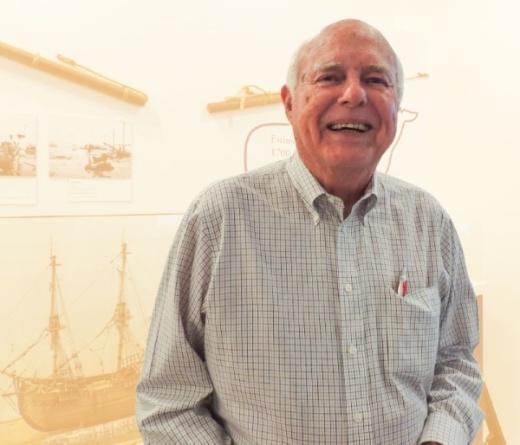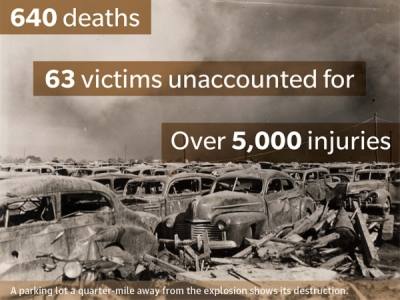The disaster involved the explosion of 2,200 tons of ammonium nitrate fertilizer on a French ship docked in the Port of Texas City. The original explosion initiated a reaction of several other explosions and fires in nearby ships and facilities, including the Monsanto Chemical Co. plant, which wiped out hundreds of houses and buildings.
Robert Roten, who was 13 at the time of the disaster, was just 25 blocks away from the blast area.
Now, 72 years later, Roten is sharing his firsthand account of the disaster in the documentary film “The Fall and Rise of Texas City,” which was presented at a screening and Q&A session with Roten at the Houston Maritime Museum in the spring.
Roten was playing softball with classmates at his school’s recreation center at the time of the explosion, and the blast sent him flying 10 feet into the air, he said. The second blast, only seconds later, knocked Roten back 10 feet and sent shrapnel flying.
“I was just in seventh grade, so I really didn’t think much about safety,” Roten said. “A lot of people didn’t want to live in Texas City ... but I didn’t think much of it.”
After the blasts, Roten said he walked home to check on his family. Fortunately, Roten’s sisters and parents survived the accident, with only minor shrapnel injuries incurred by one of his sisters, he said. There were also several injured neighbors Roten’s mother was helping.
“The physical concern was the well-being of my family, my house, and I was not overly concerned about if everybody was OK or did we have a future. I never thought of that too much,” Roten said.
Roten recalls how quickly the Red Cross and Salvation Army arrived to assist victims. All but one of the 28 Texas City Fire Department members were killed in the initial explosion and while fighting the ship fire, so emergency services were coming from outside of the city, he said.
The Red Cross funded a temporary shelter that could house up to 500 people, called the Refugee Village, Roten said. The shelter allowed those who lost their homes to the explosions and fires to stay free of charge.
After the accident, Texas City ensured each facility had a major safety program and plan not only to react to accidents, but also to prevent them. Since the Texas City disaster, the population of Texas City has grown from around 10,000 to over 40,000, and the Port of Texas City is now one of the leading ports in the U.S., he said.
“Indeed with the guts, the courage and the foresight, Texas City could rebuild,” Roten said.
Roten stayed in Texas City. Despite having experienced the disaster, Roten said Texas City is a wonderful place.
“Some people said Texas City would never recover,” he said. “[They were] absolutely wrong.”





